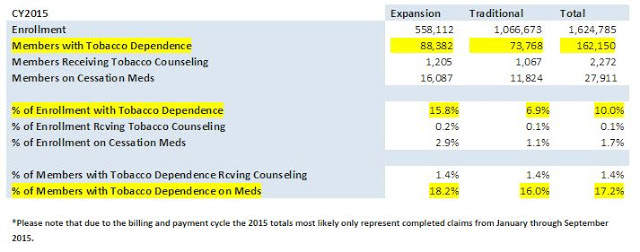162,000 Ky. Medicaid members are slaves to tobacco, but only 17% of them use their smoking-cessation benefits

Kentucky Health News
Ten percent of Kentuckians on Medicaid are dependent on tobacco, but fewer than 2 percent — less than one in five of those who are dependent — are using Medicaid to quit. Those statistics could play a role in how Kentucky changes its version of Medicaid.
In 2015, only 17.2 percent of Medicaid recipients used smoking-cessation medications, even though such meds are available to them at little to no cost. Only 1.4 percent of received smoking-cessation counseling, according to data from the state Cabinet for Health and Family Services.
Smoking is the leading cause of premature death and preventable disease in the U.S. and Kentucky, which leads the nation in lung cancer and deaths from it. Treatment for smoking-related illness is expensive, and taxpayers are footing the bill for Medicaid recipients, more than one-fourth of Kentuckians.
Almost $600 million of Kentucky’s annual Medicaid expenses are for smoking-related illnesses, Ashli Watts, director of public affairs for the Kentucky Chamber of Commerce, said on Kentucky Educational Television in October.
The chamber wants the General Assembly to pass a statewide ban on smoking in workplaces as a way to save money for taxpayers and employers. “We can simply no longer afford to ignore this issue,” Watts said. “Smoking is not only killing us, it is bankrupting us.”
Medicaid expansion added to burden caused by tobacco
Gov. Matt Bevin plans to revise Medicaid to reduce its costs, perhaps by requiring better-off recipients to pay premiums, co-payments or deductibles. State Senate President Robert Stivers, a fellow Republican, says the program should include incentives to stop smoking, as private health insurance does, by charging smokers higher premiums.
Tobacco has a bigger impact on Medicaid than it did before 2014 because of then-Gov. Steve Beshear’s expansion of Medicaid eligibility to 138 percent of the federal poverty level. Among the 558,000 people covered by the expansion, 16 percent are tobacco-dependent. Among traditional Medicaid, which covers poorer people, only 7 percent are.
The federal government is paying the entire cost of the expansion through this year. Next year, states will begin paying 5 percent, rising in annual steps to the reform law’s maximum of 10 percent in 2020. Bevin and Stivers say the state can’t afford that.
Federal health reform required all state Medicaid programs to cover at least some counseling and federally approved therapies such as nicotine gum and drugs like bupropion and varenicline (brand names Welbutrin and Chantix, respectively).
But in Kentucky and other states, smoking-cessation medications are being under-utilized nationwide, according to a recent study at the George Washington University Milken Institute School of Public Health. The study, published in the journal Health Affairs, found that only 10 percent of all Medicaid participants took advantage of the medications in 2013. About one-third of U.S. adults with Medicaid smoke, a GWU news release said.
“The utilization of anti-smoking drugs varied widely from a high of about 30 percent of Medicaid smokers in Minnesota to less than 1 percent in Texas,” the release said.
 |
| Association of Health Care Journalists map; click on it to enlarge |
The use of the medications was more extensive in Kentucky and other states that expanded Medciaid, NPR notes.
“These data show that most Medicaid programs could do much more to help smokers quit,” Leighton Ku, lead author of the study, said in the news release. “Data from the Centers for Disease Control and Prevention suggests that medical treatments for smoking-related diseases will cost the Medicaid program about $75 billion in 2016 but we spend less than one-quarter of one percent of that amount to help smokers quit.”
Another study estimated that $1 invested in tobacco cessation lowered Medicaid expenditures by about $3 because of a rapid reduction in hospital visits for cardiovascular disease, says the report.
Audrey Darville, a certified tobacco treatment specialist with UK HealthCare, said on KET that only three to five people out of 100 are successful when trying to stop “cold turkey” and emphasized the importance of getting evidence based help.
People who engage in cessation counseling, tobacco cessation medications and individual counseling are the most successful, with a 40 to 60 percent success rate of “staying quit,” she said. For more information about tobacco cessation treatment through Medicaid in Kentucky, click here.
